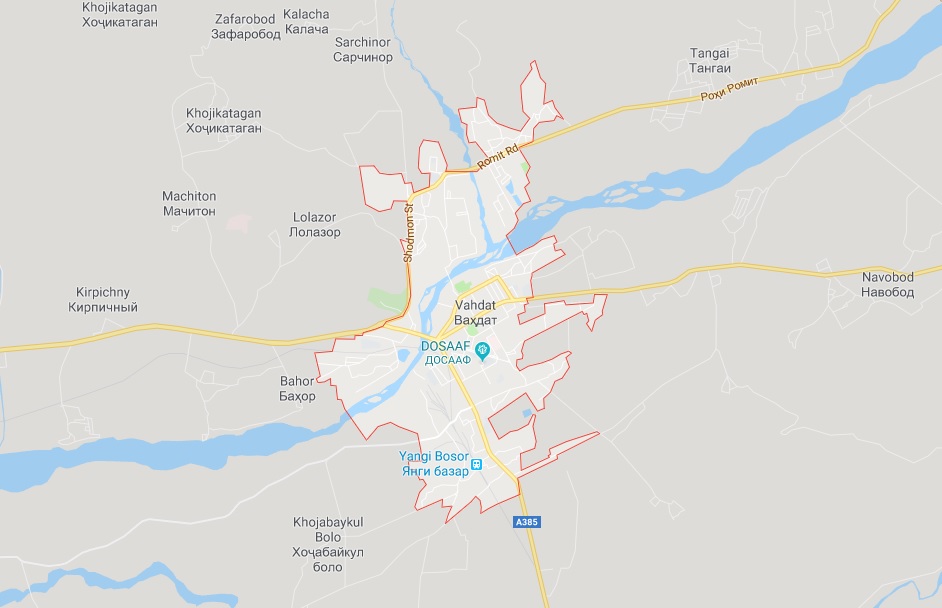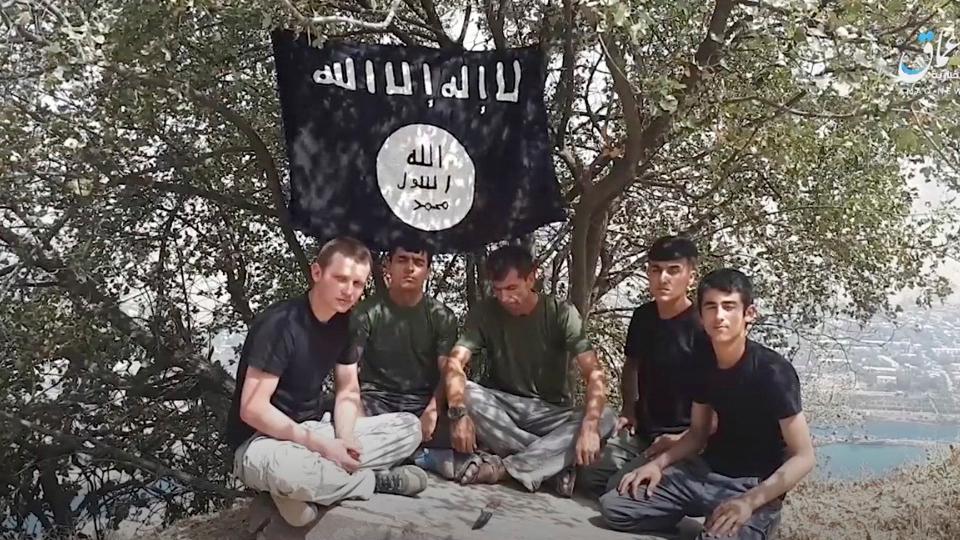Dozens killed in riots instigated by Islamic State members in Tajikistan prison
At least 32 people, including three guards and 29 inmates, were killed in riots allegedly instigated by Islamic State (IS) militants at the Kirpichniy high-security prison in Tajikistan on Sunday, the country’s Justice Ministry said on Monday, May 20.
A group of IS members, armed with knives, killed at least three guards before releasing fellow IS convicts and launching attacks on other inmates, the statement said.
The riot broke out late on Sunday in Vahdat, 10 kilometres east of the capital Dushanbe. The Kirpichniy prison is home to 1,500 prisoners.
Satellite image of the Kirpichniy maximum security prison.
One of the instigators of the riot was Bekhruz Gulmurod, son of Colonel Gulmurod Halimov, a Tajik special forces colonel who defected to IS in 2015 and, according to the ministry, has since been killed in Syria. He went missing in 2015 before subsequently re-emerging on the Internet, saying he had joined the Islamic State extremist group. In April 2017, Western media reports quoted Iraqi officials as saying that Halimov was killed in an air strike in Mosul. He remained on UN Security Council’s sanctions list until his death. Halimov was added to the U.S. State Department’s list of foreign terrorists on 29 September 2015.
Gulmurod Halimov during his days with Tajik special forces (OMOH).
Colonel Gulmurod Halimov
Gulmurod Halimov was born on 14 May 1975 in Varzob in the west of the Tajik Socialist Republic, now Tajikistan and then part of the Soviet Union.
Halimov declares his support for IS in 2015 in a propaganda video (screenshot from the video)
He was handpicked by Tajik president Emomali Rahmon to lead the OMON, the special police forces under the Tajik interior ministry charged with suppressing Islamist insurgent and terrorist activity in Tajikistan. He has also worked in the presidential guard, and received training from the United States. Between 2003 and 2014, he attended five U.S.-funded courses, three of them in the United States and two in Tajikistan.
Halimov and his son - (This picture was posted on an IS affiliated Twitter account) - November 2016. Credit: Jasmine Opperman
In August 2016, the U.S. State Department called Halimov a key member of IS and the State Department offered a $3 million reward for information on his whereabouts. On 8 September 2017, the Russian government claimed that he had been killed in an airstrike in Deir ez-Zor Governorate, Syria. He was Islamic State’s ‘Minister of War’ at the time.
His second wife, Humayro Mirow, who escaped to Iraq and joined Halimov in 2015, was a press secretary of the Chief of the Customs Service of Tajikistan and an employee of the press service of Ministry of Internal Affairs. Humayro escaped to Iraq along with Halimov’s 4 children.
Humayro Mirow (Credit: Jasmine Opperman)
Halimov disappeared on 23 April 2015, and then reappeared in an IS video on 28 May 2015, brandishing a sniper rifle, in which he made a reference to the ‘misery of Tajik working migrants in Russia’, and spoke of his eagerness to bring holy war back to Tajikistan to overthrow “you dogs, the president and ministers”, and to impose Sharia law. Halimov also threatened the United States in the same video, saying “Listen, Americans, you pigs. I have been three times to America, and I saw how you train fighters to kill Muslims,” he said, in reference to his past U.S.-provided anti-terrorist training. “God willing, I will come with this weapon to your cities, your homes, and kill you”.
The former colonel’s son, Behruz Gulmorodov, who is named as one of the prime instigators from the group of IS members who instigated riots in the prison, was arrested in April 2017. Behruz had allegedly been planning to join his father in IS-held areas of Syria just before he was arrested. The Tajik government did not specify whether the younger Behruz was among those killed in the riot.
In July 2017, four relatives of Halimov’s—two brothers and two nephews—were reported by police to have been killed when security forces raided the village of Ibrat in the Vose district of Khatlon Province of Tajikistan. One of the brothers was named Sultanmurad Khalimov, aged 52, while nobody else was named. The brothers had apparently been under surveillance in Dushanbe by Tajik intelligence services, and were trailed when they left the capital earlier in the day. According to a security source, they were trying to cross into Afghanistan with three other men. Ibrat village is around 15 miles from the Afghan-Tajikistan border.
During the May 19 riots, Tajik security forces killed 24 prisoners and restored order in the prison which has 1,500 inmates, the ministry’s statement said.
Among prisoners who were killed were two senior and several other members of the Islamic Renaissance Party of Tajikistan (IRPT), an Islamist party that was outlawed by the government of Tajik President Imomali Rakhmon in 2015. Another was a prominent Tajik cleric convicted on charges of calls to overthrow the government.
The IRPT on May 21 in a report on its Payom website accused the government of a cover-up and said that the only body that the authorities have agreed to hand over to relatives — that of Abduusattor Karimov, a member of the IRPT’s supreme political council — appeared to bear signs of gunshot wounds to the head. Tajik officials say Karimov was summarily executed by IS militants during the riot in the prison. Neither claim could be subjected to independent scrutiny.
Payom published photos of Karimov wrapped in a bloodied white sheet.
Abduusattor Karimov
Karimov was sentenced to 26 years in prison in 2016 for alleged involvement in a coup attempt.
The body of another IRPT member killed at Kirpichniy — party founder Said Kiemitdin Gozi — was buried without ceremony by the government. Gozi’s family were denied the opportunity to view the body and perform Islamic burial rituals.
The IRPT has said that it believes government assertions about Islamic State culpability for those deaths may be aimed at bolstering claims that it was the militant group that was responsible for the entire incident.
The Islamic State terror group has not yet released a statement for the prison riots.
Temur Varki, a spokesman for the Europe-based opposition movement National Alliance of Tajikistan, has said that his group is now conducting its own investigation.
“The authorities have published conflicting reports about how it all happened and who, according to their versions, is guilty of murder. There are many logical inconsistencies and outright lies. We are trying to create an objective account and make it known internationally,” he said.
The IRPT has urged that international organizations, such as the International Committee of the Red Cross, also run their own probes.
In November 2018, IS claimed responsibility for another Tajik prison riot which followed a deadly attack by its followers on tourists in July 2018.
IS claim for the July 2018 attack on tourists in Tajikistan, which killed four cyclists including two Americans, as well as a Swiss and a Dutch national, described the attackers as "soldiers of the Islamic State" and said that the attackers were "responding to calls to target citizens of Coalition countries".
Screenshot taken from an IS propaganda video shows five men in Tajikistan declaring allegiance to IS leader Abu Bakr al-Baghdadi in July 2018. This group of five men carried out the July 2018 attack which included vehicle ramming and stabbing targeting tourists in the country. - AP
It is believed that well over 1,000 Tajiks have gone to the Middle East to fight with jihadist groups, with over 500 of them having been killed, many of who died as suicide bombers. Several Tajik suicide bombers were part of the IS ‘defense’ of Mosul in 2016. Over 100 Tajik fighters are believed to have returned to their country while several others have been arrested by the anti-IS Coalition forces in Iraq and Syria.
In January 2019, Kurdish group YPG announced the arrest of 8 foreign militants, which also included a 22 year old Tajik militant named Mohammad Dawlat alias Abu Moshab Tajiki.
Mohammad Dawlat alias Abu Moshab Tajiki. Photo released by YPG
Following the loss of territory by the Islamic State in the Middle East, the Tajik government is brokering a deal to repatriate women and children affiliated with the terror group in a move that has sparked concern among some observers that they could pose an additional security threat to authorities already struggling to contain Islamists in the country that is ruled by an authoritarian government. In April 2019, Tajik government repatriated 84 children belonging to IS families in Iraq while their mothers were jailed in Baghdad for being members of IS.
On April 30, 2019, 84 Tajik and Russian teenagers flocked to Dushanbe from Baghdad on a plane belonging to the Fly-Erbil Air Force. Credit: RFE/RL
Credit: RFE/RL
UPDATE:
On June 13th, Islamic State released al-Naba magazine issue # 186, in which it formally claimed responsibility for May 20 prison riots in Tajikistan, saying that its ‘soldiers’ instigated the riots. However, IS offered to evidence to support its claim.
Screenshot from the al-Naba article claiming May 20 Tajikistan prison riots















